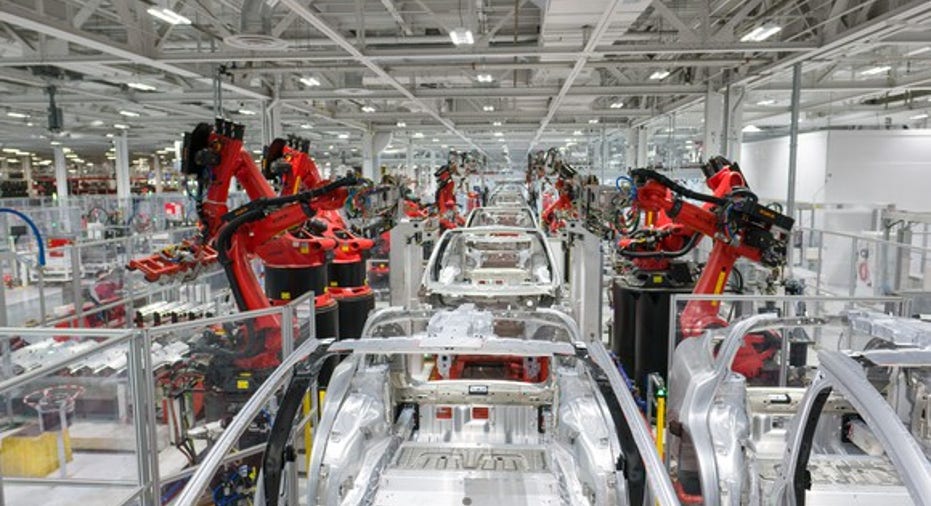Tesla Motors, Inc. Won't Need to Raise Cash This Quarter After All

Image source: The Motley Fool.
In August, electric-car maker Tesla Motors (NASDAQ: TSLA) said in a filing with the Securities and Exchange Commission related to its proposed acquisition of SolarCity (NASDAQ: SCTY) it was planning to "raise additional funds by the end of this year, including through potential equity of debt offerings." And this excerpt has remained even in Tesla's most recent S-4 filing related to the acquisition, dated Oct. 7.
But investors should disregard this plan, according to a tweet from Tesla CEO Elon Musk on Oct. 9. Further, Musk said the company no longer needs to raise cash in Q4 -- and probably won't need to in the first quarter of next year either.
Cash needs
When Tesla said it planned to raise cash by the end of the year, it wasn't a surprise. Tesla's free cash flow in the trailing twelve months is negative $1.65 billion. And specifically in Tesla's most recent quarter, which benefited from Model 3 reservation deposits, the automaker still reported negative free cash flow of $144 million.
Further, Tesla plans to spend huge sums of money in the coming quarters. The company has guided for capital spending in the second half of the year to increase 340% compared to the $512 million the company spent during the first half.
Tesla undoubtedly has some great reasons for rapid spending, including preparations for Model 3 production, costs related to the possible acquisition of SolarCity, development of next-generation Autopilot technology and energy storage products, ongoing Gigafactory construction, and the continued expansion of its Supercharger network and service and retail locations, among other projects.
It's definitely notable, therefore, for a company burning cash as fast as Tesla, and with these sort of spending plans on the horizon, to delay a capital raise by quarter more.
What has changed?
Tesla's purported delay in its capital raise could be due to several factors, including changes to the timeline for capital spend, disciplined spending, growing customer deposits for vehicles, and higher gross profit margins on its products than expected. But it's likely the biggest factor influencing Tesla's decision to delay capital requirements is the company's enormous third-quarter deliveries.
Tesla production at Fremont, California factory. Image source: The Motley Fool.
In Q3, Tesla delivered 24,500 vehicles, representing 111% year-over-year growth and 70% sequential growth. Even more, the bulk of these deliveries -- 15,800 -- were Model S units. As its older vehicle model, its costs far lower than those for the late-2016-launched Model X, so with Tesla reporting not only record deliveries but also a high ratio of Model S deliveries for the quarter, the company may have generated more gross profit than it was anticipating.
Tesla said in its most recent SEC filing that vehicle deliveries are one of the company's predominant sources of cash, so it would make sense for higher-than-expected deliveries in the second half of the year to alleviate some cash needs.
Notably, a delayed capital raise gives Tesla's stock price time to increase before a potential equity offering. A higher stock price in the case Tesla chooses to raise capital via an equity offering would mean less dilution for shareholders. Of course, delaying an equity offering could also work against Tesla in the case the stock price declines.
The biggest win for investors out of all of this would be if Tesla ends up needing to raise less total cash through equity offerings or corporate debt than it was planning for. While a delayed need for cash makes a case this could end up happening, it's not certain.
Look for Tesla to provide more insight into why it no longer needs to raise additional funds before the end of the year when the company reports third-quarter results on Oct. 26.
A secret billion-dollar stock opportunity The world's biggest tech company forgot to show you something, but a few Wall Street analysts and the Fool didn't miss a beat: There's a small company that's powering their brand-new gadgets and the coming revolution in technology. And we think its stock price has nearly unlimited room to run for early in-the-know investors! To be one of them, just click here.
Daniel Sparks owns shares of SolarCity and Tesla Motors. The Motley Fool owns shares of and recommends SolarCity and Tesla Motors. Try any of our Foolish newsletter services free for 30 days. We Fools may not all hold the same opinions, but we all believe that considering a diverse range of insights makes us better investors. The Motley Fool has a disclosure policy.



















